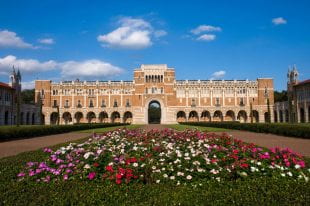Rice University
Office of Public Affairs / News & Media Relations
NEWS RELEASE
Doug Miller
713-348-6770
doug.miller@rice.edu
Jeff Falk
612-964-7236
jfalk@rice.edu
Rice announces tuition for 2020-21 school year
HOUSTON — (March 25, 2020) – Rice University’s undergraduate tuition for the 2020-21 school year will be $50,310, an increase of $1,980 over the current year. The total cost, including $14,500 for room and board and $797 in mandatory fees, will increase 3.7% to $65,607.
 As in previous years, Rice will meet the full financial need of admitted students. Last fall, the university admitted its first students qualified for the Rice Investment, an enhancement of its financial aid program for all undergraduate domestic students enrolled at Rice. The Rice Investment offers students with family incomes below $65,000 grant aid covering their full tuition, mandatory fees, room and board; students with family incomes between $65,000 and $130,000 receive grants covering at least full tuition; and students with family incomes between $130,000 and $200,000 receive grants covering at least half tuition. (The grants assume that families have typical assets for these income levels.) Also, under the Rice Investment, the university does not require loans as part of financial aid requirements for students whose family income is below $200,000. Those with family incomes higher than $200,000 may also receive aid based on a determination of financial need.
As in previous years, Rice will meet the full financial need of admitted students. Last fall, the university admitted its first students qualified for the Rice Investment, an enhancement of its financial aid program for all undergraduate domestic students enrolled at Rice. The Rice Investment offers students with family incomes below $65,000 grant aid covering their full tuition, mandatory fees, room and board; students with family incomes between $65,000 and $130,000 receive grants covering at least full tuition; and students with family incomes between $130,000 and $200,000 receive grants covering at least half tuition. (The grants assume that families have typical assets for these income levels.) Also, under the Rice Investment, the university does not require loans as part of financial aid requirements for students whose family income is below $200,000. Those with family incomes higher than $200,000 may also receive aid based on a determination of financial need.
“We recognize at Rice that this is an unprecedented challenging and uncertain time for our students and their families, and for many their financial situations are in flux,” Rice President David Leebron said. “We are committed to sustaining through these times the excellence, opportunity and impact that characterize Rice. We will continue ensuring through generous financial aid that our newly admitted and returning students will have this opportunity regardless of their financial circumstances.”
One of the key goals of Rice’s Vision for the Second Century, Second Decade (V2C2) is to expand access, diversity and inclusiveness. That includes building on the university’s history of recruiting high-achieving students from underresourced and middle-class families and assuring affordability by providing financial aid policies that allow them to experience the full range of educational opportunities at Rice.
As a result of its generous financial aid and comparatively low tuition among private research universities — in addition to its broad range of outstanding academic programs — Rice is often named one of the country’s best-value private schools. For example, Rice is No. 7 in Kiplinger’s Best Value Rankings of Private Universities, No. 13 in U.S. News Best Value rankings and No. 6 for offering “great financial aid” in the 2020 edition of the Princeton Review’s guidebook.
Graduate education costs for 2020-21 vary for different programs. Tuition for doctoral students will increase to $50,310. Tuition for graduate students in architecture will be $33,000. Tuition for graduate students in music will be $29,500. Tuition for students in the professional master’s programs will be $20,000 for religion, $39,000 for global affairs, $35,000 for human-computer interaction and human factors, $38,250 for master’s programs in natural sciences, $51,500 for master’s programs in engineering and $58,000 for energy economics. Tuition will be $60,940 for students in the full-time MBA program at Rice’s Jones Graduate School of Business. Tuition for other Jones School programs will be $55,625 for the Master of Accounting, $109,930 for the MBA@Rice and the Evening MBA for Professionals, $115,050 for the Weekend MBA for Professionals and $131,630 for the Executive MBA.
For more information on Rice, visit www.rice.edu. For information about financial aid programs and to apply, see www.futureowls.rice.edu.
-30-
This release can be found online at news.rice.edu.
Follow Rice News and Media Relations via Twitter @RiceUNews.
Located on a 300-acre forested campus in Houston, Rice University is consistently ranked among the nation’s top 20 universities by U.S. News & World Report. Rice has highly respected schools of Architecture, Business, Continuing Studies, Engineering, Humanities, Music, Natural Sciences and Social Sciences and is home to the Baker Institute for Public Policy. With 3,962 undergraduates and 3,027 graduate students, Rice’s undergraduate student-to-faculty ratio is just under 6-to-1. Its residential college system builds close-knit communities and lifelong friendships, just one reason why Rice is ranked No. 1 for lots of race/class interaction and No. 4 for quality of life by the Princeton Review. Rice is also rated as a best value among private universities by Kiplinger’s Personal Finance.

